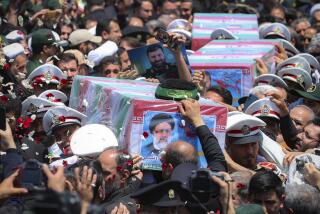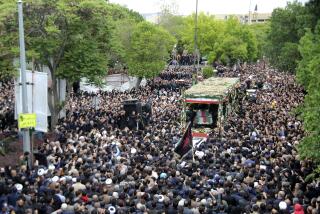‘Just Like I Love My Family, I Loved Him’ : Chinese Enclave Mourns Taiwan Leader
- Share via
It was a simple and unimposing memorial that had been set up at the back of a meeting room in Alhambra.
A portrait was propped up beneath the glare of fluorescent lights; nearby, a mourner had tacked a poem on the wall, and a few wreaths of white flowers had been left--one by a postman, another by a retired Taiwanese army colonel.
There was nothing grand about this memorial, but in recent days a slow but steady trickle of mourners has come to pay their last respects to a man whose death has startled the Chinese community.
“Just like I love my family, I loved him,” said Wei Ya-chih, an insurance saleswoman from Montebello who came to the United States from Taiwan six years ago. “We are all shocked and worried, too.”
The Jan. 13 death of Chiang Ching-kuo, the 77-year-old president of the Republic of China, has sent ripples of sadness and concern throughout the Chinese community--especially in the San Gabriel Valley, which has one of the nation’s largest populations of Chinese from Taiwan.
From the noodle houses on San Gabriel’s Valley Boulevard to the bustling Chinese supermarkets in Monterey Park, many have been talking about what the future might hold after a decade of Chiang’s leadership.
Mourners tell of a flood of phone calls back and forth from Taiwan to the United States. Chinese-language newspapers have been snapped up by readers anxious to devour any news about the death of Chiang, the son and successor of Chinese Nationalist leader Chiang Kai-shek.
“The newspaper sales must have shot up,” said Tan Shih-ying of West Covina. “We are all just trying to figure out what is going on.”
But as people searched for news of the situation in Taiwan, many also took a few minutes to pay their last respects to the man they credit with leading them through an era of political liberalization and economic prosperity.
Mourners pointed to Chiang’s lifting of 40 years of martial law in 1987 and his role in creating the nation’s first opposition party, the Democratic Progressive Party.
The memorial at the Chinese Culture Service Center in Alhambra is one of six sites around Los Angeles where mourners could pay their last respects.
Huang Kung-bee, the director of the service center, said the Alhambra memorial will stay open until Saturday, when a large memorial service is scheduled at the Confucius Temple School on Yale Street in Chinatown.
“They come one by one,” Huang said. “They have very special emotions. Some have even cried.”
He said the emotions ran deep because Chiang and his father had been their only leaders since 1949, when the Nationalists fled the Chinese mainland.
“We have spent our whole lives together,” Huang said.
One man who visited the memorial with his children and grandchildren left behind an impromptu poem that read in part: “Even the mountains know the sorrow of the people.”
A modest shrine has been erected at the center, with the traditional four plates of fruit in front of Chiang’s portrait, a sign of respect for the deceased.
The portrait is framed with dozens of carnations that had begun to wilt after a few days. The flowers were all white--the symbol of death and purity.
Four days after the memorial was set up, a visitors book at the door bore the signatures of about 400 people.
Amy Wang, a San Gabriel resident who came to this country five years ago from Taiwan, said many young immigrants who experienced the reforms and prosperity under Chiang’s rule were especially saddened by his death.
“He helped raise us from poor to rich, from old to modern and open,” Wang said.
Teresa Lee, 27, of Torrance, who stopped by the memorial on her way to see a friend, said: “I feel sad. Presidents and emperors always seem to feel that they are better than the people. But this president wanted to help us. I feel close to him.”
Like many others, Wang called her family in Taipei, the capital of Taiwan, after hearing the news of Chiang’s death, to find out what was happening back home.
“She said the situation is good there,” Wang said. “But we all wonder if the next leader will have his ability.”
Despite the concerns, most remain confident of the future.
Wei, who came to this country six years ago and still remembers the time when her family washed their clothes by hand and dressed shabbily, spoke for many when she said the country had progressed too far to sink back into poverty and political upheaval.
Steve Chang, vice chairman of the Taiwan Benevolent Assn., said he was sad that many young people born in the United States had little idea of their parents’ homeland and the significance of Chiang’s death.
“My kids are born here,” he said. “You talk to them about President Chiang and they don’t know what you are talking about.”
But he added: “I know in my mind that one day I will tell them about President Chiang.”
More to Read
Sign up for Essential California
The most important California stories and recommendations in your inbox every morning.
You may occasionally receive promotional content from the Los Angeles Times.














